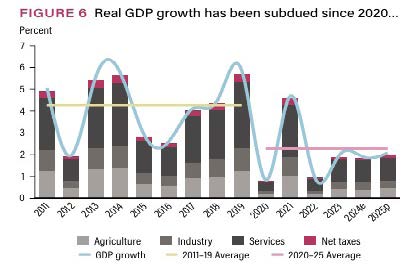Key Business Points
- Restoring macroeconomic stability is crucial for Malawi’s growth, and can be achieved by increasing domestic revenue, reducing wasteful spending, and controlling borrowing, as emphasized by the World Bank’s senior economist, Jakob Engel, who stated that "the most important priority is to stabilise the macroeconomy by reducing fiscal and external imbalances."
- Supporting investment and export growth can be done by phasing out implicit fuel subsidies, implementing reforms to support the mining sector, and reducing trade barriers, which will help to increase foreign direct investment and promote export-led growth, thereby boosting the country’s economic growth and development.
- Building resilience and protecting the poor requires addressing growth risks from climate change, investing in climate-resilient agriculture, and mitigating food insecurity, which is essential for ensuring that the country’s economic growth is inclusive and sustainable, as noted by Centre for Social Concern economic governance officer Agnes Nyirongo, who called for "pro-poor fiscal restructuring" to protect essential services such as health, education, and social cash transfers.
The World Bank has outlined a three-point framework to create conditions for growth in Malawi, warning that widening fiscal and external deficits threaten growth, investor confidence, and access to future development support. The macroeconomic stability of the country is under threat, with a current account deficit of 22 percent of GDP and foreign exchange reserves falling to $521 million, providing only 2.1 months of import cover. To address this, the World Bank recommends increasing domestic revenue through reforms to increase progressivity of the tax system and the efficiency of tax administration, reducing wasteful spending, and finalizing debt restructuring and controlling borrowing and reducing inflation.
The World Bank also emphasizes the need to support investment and export growth by phasing out the implicit fuel subsidy, implementing reforms to enable the mining sector to support growth over many decades, removing foreign exchange surrender requirements, and reducing trade barriers. This will help to increase foreign direct investment and promote export-led growth, thereby boosting the country’s economic growth and development. Additionally, the World Bank recommends building resilience and protecting the poor by addressing growth risks from climate change, investing in climate-resilient agriculture, increasing shock-responsiveness and sustainability of the social protection system, and mitigating food insecurity.
Economists and experts in Malawi have welcomed the World Bank’s recommendations, with Economics Association of Malawi president Bertha Bangara-Chikadza advocating for structural reforms rather than punitive measures, and calling for the country to revisit tax incentives and plug inefficiencies. Bangara-Chikadza also emphasized the need to activate integrated financial management information system’s procurement module and adopt an e-procurement system to enhance transparency and reduce elite capture. Centre for Social Concern economic governance officer Agnes Nyirongo called for pro-poor fiscal restructuring, urging the government to protect health, education, and social cash transfers, and to enhance transparency, reduce elite capture, and support climate-resilient and gender-responsive development.
As the fiscal gap widens and donor confidence is shaken, the space for credible reform is shrinking, and development partners are watching for signs of fiscal discipline and transparency. Whether Malawi stabilizes or slips deeper into crisis will depend on how quickly and inclusively the government acts on the reforms. As Jakob Engel noted, "it is critical to build up RBM forex reserves by increasing market purchases and shifting foreign exchange from informal to formal channels, calling for export promotion, more foreign direct investment, and a reduction in the country’s import bill." By implementing these reforms, Malawi can create a more favorable business environment, attract foreign investment, and promote economic growth and development, which will ultimately benefit the country’s business community and entrepreneurs, including those in the mkhonde and njinga sectors.
What are your thoughts on this business development? Share your insights and remember to follow us on Facebook and Twitter for the latest Malawi business news and opportunities. Visit us daily for comprehensive coverage of Malawi’s business landscape.
- Malawi’s K1.2tn Gold Smuggling Scourge: A Threat to Business Growth and Economic Stability - February 1, 2026
- Revitalizing Malawi’s Economy: Lower Food Prices Signal New Growth Opportunities - January 31, 2026
- Revitalizing Malawi’s Economy: Tackling Climate Related Underfunding for Sustainable Growth - January 30, 2026

